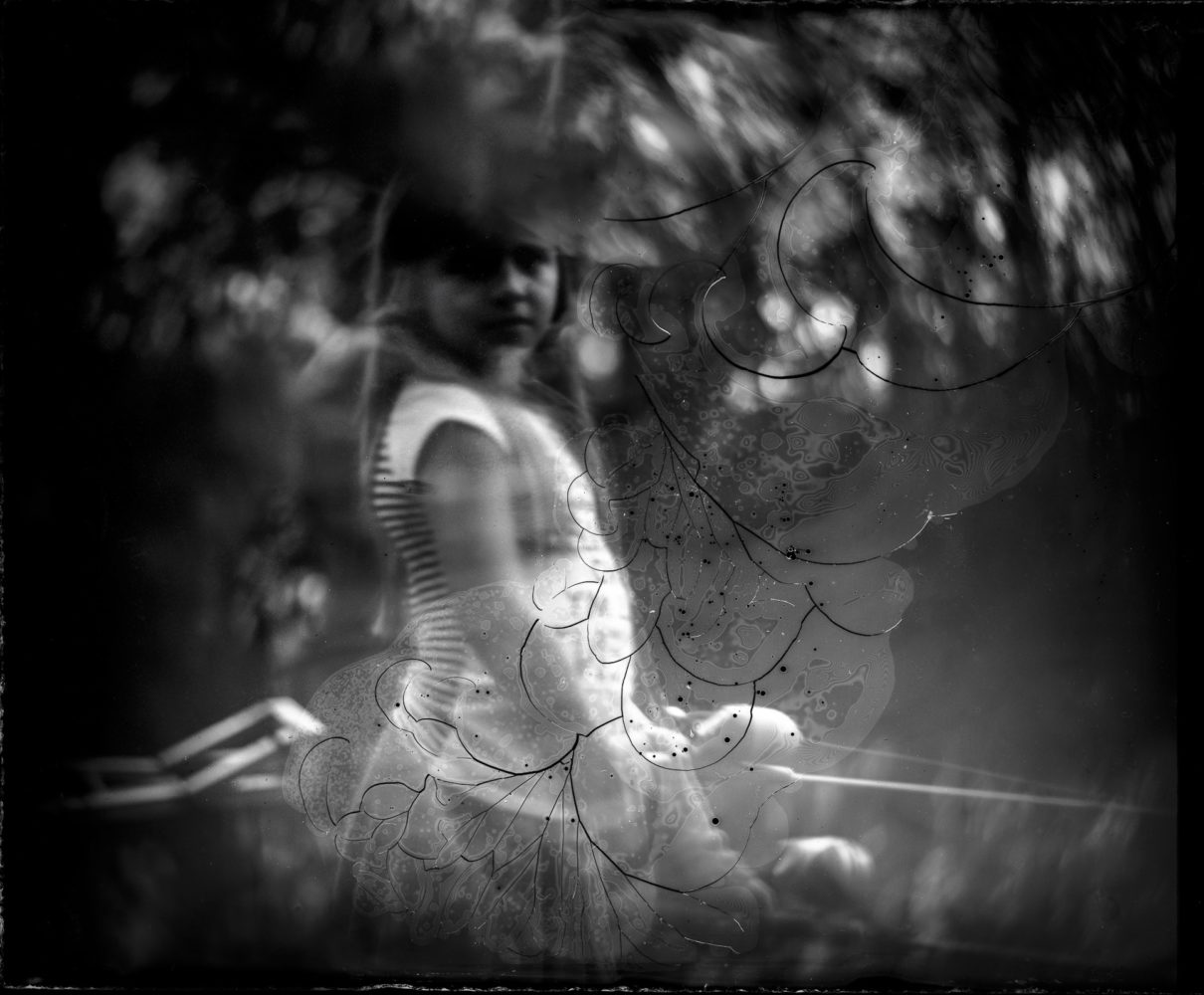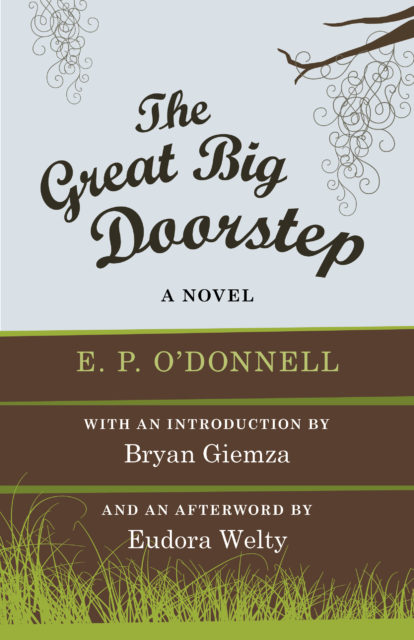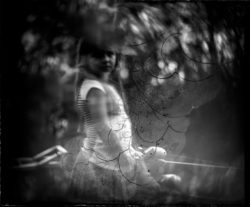Lost Lit
Plaquemines Picaresque
On the road with The Great Big Doorstep, the second and final novel by New Orleans writer E. P. O'Donnell
Published: June 7, 2018
Last Updated: July 1, 2019

Courtesy of the artist
by Cate Colvin Sampson
Twice a year I make it down Plaquemines’ way: once for fishing and, come summer, a leisurely weekend drive from New Orleans to explore the peninsula, that scraggily, riverine toe slipped from the boot-shape state. I alternate my drives, sometimes crossing the Mississippi River to follow long, leveed Highway 23 past countless oil refineries toward Venice, other years steering serpentine Highway 39 straight into what feels like the great maw of the Gulf of Mexico.
But no matter how often I traverse either route, no matter how many satsumas and navels I slurp along the way, Plaquemines Parish never quite feels familiar. Maybe it’s the fact that my family fled for higher ground decades ago. Perhaps it’s the fluid nature of the Mississippi itself, and the brief spits of spongy land that line either side. In 100, maybe even 50 years, climatologists and geographers tell us, little will remain of Plaquemines’ toe. Why get to know it at all?
Nine decades ago, in November 1928, an aspirant New Orleans writer named E. P. O’Donnell undertook a three-week trek along the west bank of the river, walking seventy miles to the levee’s terminus outside the town of Boothville. The walk would inspire a series of short stories and a novel, Green Margins, published in 1932. O’Donnell eventually relocated to Boothville part-time, working out of a writing cottage, while taking seasonal labor jobs: picking oranges and lilies, fishing shrimp and oysters. In 1941, a second and final novel appeared, The Great Big Doorstep.
Told in a humorous picaresque style, this novel chronicles the travails of the Crochets, a Cajun family who reside in the fictional community of Grass Margin, an apropos name for the precarious swath of alluvium — commonly called the batture — squeezed between river and levee. They inhabit “the lousiest shack on the Margin,” a leaning, leaking, barely livable liability (even the toilet seat is riddled with splinters). The abode’s underbelly crawls with crawfish, the cistern swims with mosquito larvae, and, according to Mrs. Crochet, “the back steps is rotten as the devil.” But the front steps — behold!: flotsam fished from the river, lavishly sculpted from cypress, worthy of the grandest St. Charles Avenue mansions. “We got us a doorsteps,” her husband, Commode, says, “and all we need is a house.”
In 1928 O’Donnell undertook a three-week trek along the west bank of the river, walking seventy miles to the levee’s terminus outside the town of Boothville.
Commodo Crochet works as a ditch digger, or “drainage expert” in his words, floundering to find the funds for a new home. Mrs. Crochet struggles to feed her ever-burgeoning family of eight. Their eldest son is bound for a shrimping trawler. A daughter is destined for the shrimp cannery or New Orleans — no telling which is worse. Grass Marginers know that the city is filled with tourists, decrepit buildings, and dogs on leashes that “sign their names all over the sidewalks.” It’s a faraway place where people put locks on their doors, and buy and sell water despite a whole river of the stuff freely floating through town.
Daughter Evvie, fourteen going on fifteen, and about to graduate from high school, is the novel’s heart. Like the mythic Evangeline, her probable namesake, she yearns for a lover. Suitors, each more dubious than the next, come crushing: A crusty old crab fisherman named Marigny. Tayo Delacroix, the town barber and bully, who named his mule after his last girlfriend, Evvie’s sister. And Dave Tobin, a Texan with a smile so buck-toothed, locals teased, he could eat corn off the cob through a knothole in a fence. Her parents would rather she join the convent. “You supposed to be thinking about Jesus, you little witch!” Mrs. Crochet scolds as she raps Evvie with her wedding ring. “About Jesus!” After one potential beau stabs another with an oyster knife in an orange grove, the downriver version of a duel under the oaks, Evvie’s monastic vows are out of the question.
Though the novel found a readership in its day and was even dramatized on Broadway, with backing by Dashiell Hammett — the war no doubt hurt both prospects — The Great Big Doorstep is no masterpiece. Its flaws are numerous: farce often outstrips plot, Commodo’s Ignatius J. Reilly-meets-Homer J. Simpson schtick easily exasperates, and black characters are minstrelized. But despite these shortcomings, O’Donnell found a way to shine a light on Plaquemines: its people, natural glory, and grim future that portends.
Through Evvie’s eyes, the author allows us to experience Plaquemines’ extraordinary, and often bizarre, natural beauty. She earns money snaring and selling birds for crab bait: indigo buntings, scarlet tanagers, sparrows, and orange-crowned warblers. Mrs. Crochet hankers for pot-roasted suckling heron. In the family’s front yard, frogs hang from the clotheslines, bleeding out before skillet-fried. A pet raccoon, tied to a guava tree, feasts on fiddler crabs. Men carry names like Willy Stanjovich, Cake Lasalle, Plush Boardman, Emilien Perdu, and Tee Jule. Fig trees bloom like “plump green clouds.” Fields of Easter lilies dazzle in the moonlight. The air wafts ethereal with scents of orange blossom, shrimp, and sulphur. Day and night, fog cloaks the river, “the great winding world of liquid soil,” where children construct driftwood shelters and the family gathers to watch ships, jumbo-sized and pirogue-puny, ceaselessly beat upstream and down. They play a game, guessing at each boat’s port of call, while silently praying that the colossal, shore-rattling cargo ships don’t level their house.
The Crochets eventually find a new home, but so do the petrochemical and sulphur mining industries, that rumble into the parish. “Soil had been pumped from the river bed to make a healthful townsite elevated above the surrounding lowlands,” E. P. O’Donnell writes in the novel’s final pages. “Big things were being done in this little river community.” Evvie helplessly watches as cement paving replaces oyster-shell roads. Texas license plates cram the parking lots of the new drugstore and post office. Cranes fill the sky where cranes of another sort once flew. “The oil companies want to take the oil from under our marshes,” she says, “and not leave anything here.”
If Louisiana is our home place, Plaquemines Parish might just be the state’s great big doorstep: An entryway into the Gulf. Naturally ornate, singularly exquisite. Unless we rebuild that home from the ground up, those steps are very soon liable to be washed into the sea.
Rien Fertel teaches, writes, and lives in and about the South.
———-
 An annual feature of the Louisiana Book Festival is One Book, One Festival, a scholar-led reader discussion of a work by a Louisiana author. The 2018 selection is the relatively obscure comic masterpiece The Great Big Doorstep by E. P. O’Donnell. The discussion leader is Michael Bibler, Associate Professor, English Department, Louisiana State University. Thanks to LSU Press, the book is now available again, with a new introduction by Bryan Giemza, director of the University Libraries Southern Historical Collection, and including the 1979 afterword by Eudora Welty, in which she praised O’Donnell for his “supreme gift” for dialogue.
An annual feature of the Louisiana Book Festival is One Book, One Festival, a scholar-led reader discussion of a work by a Louisiana author. The 2018 selection is the relatively obscure comic masterpiece The Great Big Doorstep by E. P. O’Donnell. The discussion leader is Michael Bibler, Associate Professor, English Department, Louisiana State University. Thanks to LSU Press, the book is now available again, with a new introduction by Bryan Giemza, director of the University Libraries Southern Historical Collection, and including the 1979 afterword by Eudora Welty, in which she praised O’Donnell for his “supreme gift” for dialogue.
The Louisiana Book Festival will be held Saturday, Nov. 10, 2018, 9:00 a.m. to 4:00 p.m., in the Baton Rouge Capitol Park area. The festival is supported by a grant from the Louisiana Endowment for the Humanities.
Visit louisianabookfestival.org for more information.
